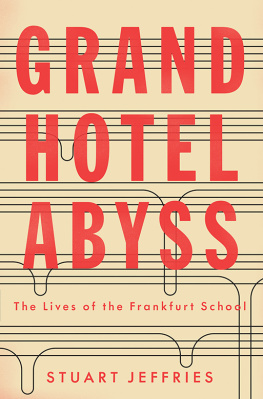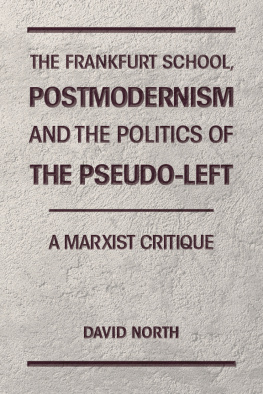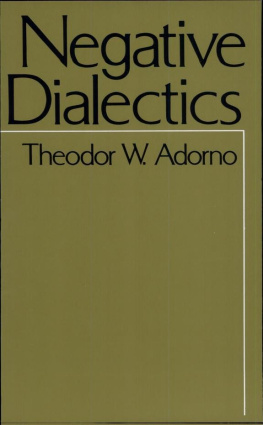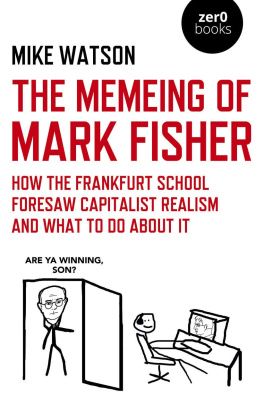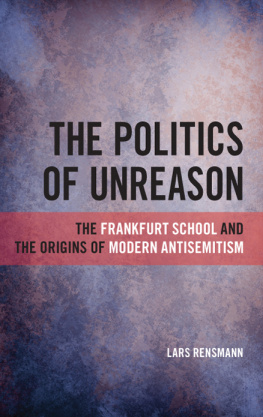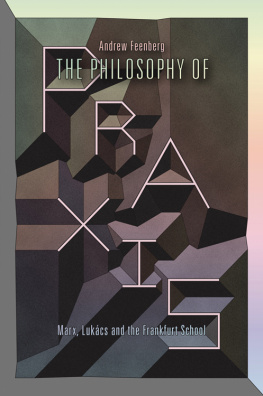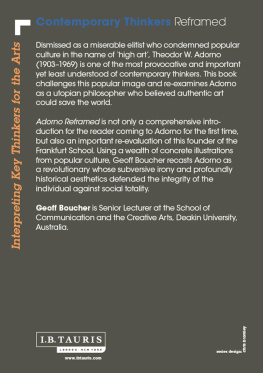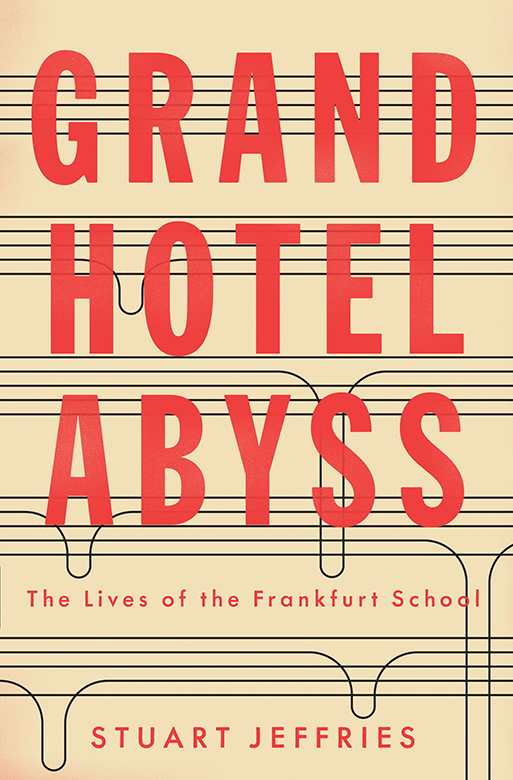Grand Hotel Abyss
The Lives of the Frankfurt School
Stuart Jeffries

This eBook is licensed to Sara Gancedo, sara.gancedo@gmail.com on 08/28/2019
First published by Verso 2016
Stuart Jeffries 2016, 2017
All rights reserved
The moral rights of the author have been asserted
1 3 5 7 9 10 8 6 4 2
Verso
UK: 6 Meard Street, London W1F 0EG
US: 20 Jay Street, Suite 1010, Brooklyn, NY 11201
versobooks.com
Verso is the imprint of New Left Books
ISBN-13: 9-781-78478-568-0
ISBN-13: 9-781-78478-569-7 (PBK)
ISBN-13: 9-781-78478-571-0 (US EBK)
ISBN-13: 9-781-78478-570-3 (UK EBK)
British Library Cataloguing in Publication Data
A catalogue record for this book is available from the British Library
Library of Congress Cataloging-in-Publication Data
Names: Jeffries, Stuart, 1964
Title: Grand Hotel Abyss : the lives of the Frankfurt School / Stuart Jeffries.
Description: London ; Brooklyn, NY : Verso, 2016. | Includes bibliographical references and index.
Identifiers: LCCN 2016015391 | ISBN 9781784785680 (hardcover : alkaline paper) | ISBN 9781784785703 (ebook)
Subjects: LCSH: Frankfurt school of sociology History. | Critical theory History 20th century. | Frankfurt school of sociology Biography. | Sociologists Germany Biography. | Philosophers Germany Biography. | Sociology Germany History 20th century. | Germany Intellectual life 20th century.
Classification: LCC HM467 .J44 2016 | DDC 301.01 dc23
LC record available at https://lccn.loc.gov/2016015391
Typeset in Minion by Hewer Text UK Ltd, Edinburgh, Scotland
Printed in the US by Maple Press
This eBook is licensed to Sara Gancedo, sara.gancedo@gmail.com on 08/28/2019
For Juliet and Kay
This eBook is licensed to Sara Gancedo, sara.gancedo@gmail.com on 08/28/2019
Contents
This eBook is licensed to Sara Gancedo, sara.gancedo@gmail.com on 08/28/2019
Not long before he died in 1969, Theodor Adorno told an interviewer: I established a theoretical model of thought. How could I have suspected that people would want to implement it with Molotov cocktails? But the intellectuals of the Frankfurt School turned Marxs eleventh thesis on Feuerbach upside down.
From its inception in 1923, the Marxist research institute that became known as the Frankfurt School was aloof from party politics and sceptical about political struggle. Its leading members Theodor Adorno, Max Horkheimer, Herbert Marcuse, Erich Fromm, Friedrich Pollock, Franz Neumann and Jrgen Habermas were virtuosic at critiquing the viciousness of fascism and capitalisms socially eviscerating, spiritually crushing impact on western societies, but not so good at changing what they critiqued.
The Frankfurt Schools apparent inversion of Marx exasperated other Marxists. The philosopher Gyrgy Lukcs once charged that Adorno and other members of the Frankfurt School had taken up residence in what he called the Grand Hotel Abyss. This beautiful hotel was, he wrote, equipped with every comfort, on the edge of an abyss, of nothingness, of absurdity. Previous residents included that earlier, pessimistic, Frankfurt philosopher Arthur Schopenhauer, whose work, Lukcs suggested, involved musing on the suffering of the world from a safe distance. The daily contemplation of the abyss between excellent meals or artistic entertainments, Lukcs wrote sarcastically, can only heighten the enjoyment of the subtle comforts offered.
The thinkers of the Frankfurt School were no different, Lukcs argued. Like Schopenhauer, the latest guests of the Hotel Grand Abyss took perverse pleasure in suffering in their case, though, in the spectacle of monopoly capitalism that was destroying the human spirit below as they reclined on the terrace. For Lukcs, the Frankfurt School had abandoned the necessary connection between theory and praxis, where the latter means the realisation in action of the former. If either was to be justifiable, they had to be united the one reinforcing the other in dialectical relationship. Otherwise, he argued, theory became merely an elitist exercise in interpretation like all philosophy before Marx.
When Adorno made his remark about Molotov cocktails, he was accounting for the Frankfurt Schools retreat into theory at a time when many around him and his colleagues were calling for action. The student movement and the New Left were at their height and many were convinced, wrongly as it turned out, that radical political change was imminent thanks to just such praxis. It was certainly a period of intense political turbulence. Students were revolting from Berkeley to Berlin, protests against the American war in Vietnam at the Democratic Party convention in Chicago had been attacked by the police, and Soviet tanks had recently rolled into Prague to put down the Czechoslovak experiment in socialism with a human face.
At the University of Frankfurt, Adorno himself, this self-admittedly paunchy, sixty-five-year-old professor and the most prominent figure of the Frankfurt School in Germany, was targeted by leaders of the Sozialistischer Deutscher Studentenbund for being insufficiently radical. His lectures were disrupted by protestors, one of whom wrote on the blackboard: If Adorno is left in peace, capitalism will never cease.
Emblematically, the universitys Sociology Department was briefly taken over by protesters and renamed the Spartacus Department, after the movement led by Rosa Luxemburg and Karl Liebknecht, the German revolutionaries murdered fifty years earlier. The name change served as rebuke and reminder: rebuke since the Spartacists of 1919 had done what the Frankfurt School of 1969, apparently, did not dare to do; reminder, since the Frankfurt School had come into being in part because of Marxist theorists attempts to understand the Spartacists failure to emulate in Germany what the Bolsheviks had achieved in Russia two years earlier.
In 1969, student leaders such as Rudi Dutschke and Daniel Cohn-Bendit believed it was time to unite theory and practice, revolutionise universities and destroy capitalism. It was precisely not time for the German intelligentsia to fail, once more, at its moment of reckoning. Adorno demurred. His compunctions explain a great deal about what the Frankfurt School was and is like and why it was and still sometimes is viewed so sceptically by many on the left. In his 1969 paper Marginalia to Theory and Praxis, Adorno noted that a student had had his room destroyed because he preferred to work rather than take part in student protests. Someone had even scrawled on his wall: Whoever occupies himself with theory without acting practically is a traitor to socialism.
To Adorno, that student was clearly a kindred spirit critical theorist rather than street-fighting man and he sought to defend him. He did so by pitting theory against the kind of praxis that he discerned in the student movement and the New Left. It is not only against him [the student who had his room trashed] that praxis serves as an ideological pretext for exercising moral constraint, Adorno wrote. That paradox, the oppressive call for liberating action, made Adorno and many other thinkers of the Frankfurt School queasy. Jrgen Habermas called it left fascism, and Adorno, his former teacher, saw in it the rise of a grisly new mutation of the authoritarian personality that had thrived in Nazi Germany and Stalinist Russia.

